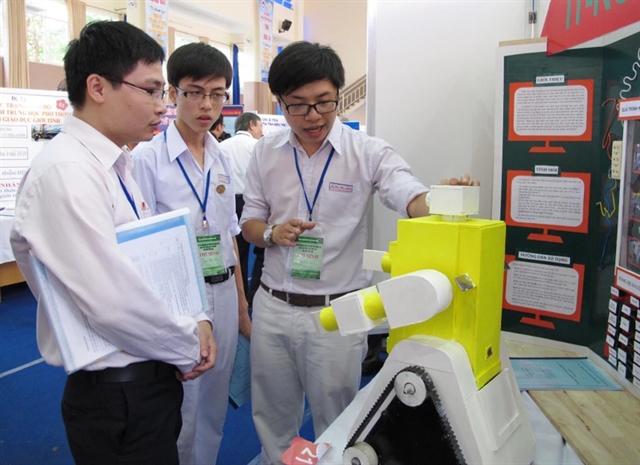 Society
Society

 |
| High school students introduce a robot they created at a science and technology contest in HCM City. — VNA/VNS Photo Phương Vy |
HÀ NỘI — The Ministry of Science and Technology (MoST) has defined the year 2024 as a key milestone in perfecting the legal framework for science, technology and innovation, which will pave the way for future sectoral development.
According to Minister of Science and Technology Huỳnh Thành Đạt, the core missions to be carried out this year include the Politburo’s and central government’s resolutions on science and technology, amending laws concerning the sector as well as the government’s decrees regarding investment, finances and autonomy models.
The MoST will also coordinate with other ministries and departments to continue implementing the Party Central Committee’s and Politburo’s direction of science-technology development for modernisation and urbanisation in a socialist-oriented market economy, alongside international integration.
The amendment of the Law on Science and Technology is seen as a top priority project for the sector in 2024.
Amid the growing demands for industrialisation and modernisation, changes to the law are aimed at perfecting the legal framework to accelerate science, technology and innovation activities in alignment with the national context.
The amendment is expected to focus on six key areas: regulations on the establishment, registration and operation of science-technology organisations; individuals working in the sector; science-technology missions; funding and finances for science-technology and innovation development; promoting innovation and start-ups; and accelerating international integration in the sector.
Deputy Science and Technology Minister Trần Hồng Thái said that the adjustments would remove existing barriers in terms of policies and finances in the sector in accordance with the market mechanism and international practices.
One of the most important solutions in response to sustainable development requirements is specific, outstanding policies and frameworks that allow science, technology and innovation to become a strategic breakthrough, according to Thái.
In practice, science-technology application and development still see shortcomings, such as incomprehensive mechanisms for autonomy and responsibility among research facilities, modest remuneration for researchers, and the utilisation of science-technology advancements in national growth.
Meanwhile, science and technology tasks, programmes and research topic selection also encounter bottlenecks in management and determining completion deadlines, in addition to the lack of incentive policies for commercialisation.
Thái said: “In particular, the risks in scientific research should not be simply understood as failures, as an unsuccessful study can also contribute to other research in the scientific community.
“Therefore, a specific mechanism is needed to acknowledge the risks and delays in scientific research and technology development.”
In addition to accelerating digital transformation and advanced technology such as artificial intelligence and big data, the MoST also identifies the possible consequences of these tools to design policies accordingly, especially from an ethical and humanistic perspective.
Science and technology solutions are expected to not only increase economic competitiveness and productivity, particularly in crop and livestock farming, but also improve people’s quality of life.
In 2023, Việt Nam’s ranking in the Global Innovation Index (GII) jumped 2 positions compared to the previous year, placing 46th out of 132 countries and economies, and retaining its second rank among the lower middle-income group.
The country also introduced its Provincial Innovation Index (PII) in 2023, which is aimed to be an effective instrument for measuring innovation capacity and results at the local level.
Initiatives to develop an innovative start-up ecosystem were also executed with the aim of creating a new generation of businesses that rely on intellectual properties and are capable of accessing the international market.
This ecosystem is considered one of the most dynamic in Asia and ranked 58th globally.
The development strategy for science, technology and innovation by 2030 has been specified through 44 national-level programmes, with a balance among all three aspects of natural sciences, social sciences and technological science. — VNS




